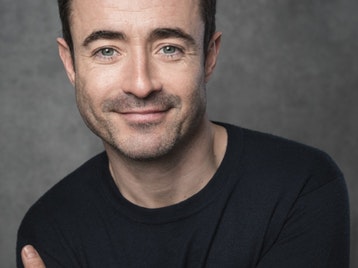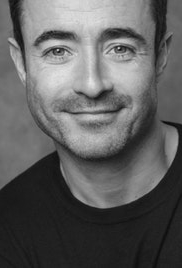
JOE McFADDEN is best known for his roles in THE CROW ROAD, SEX, CHIPS & ROCK N’ ROLL, HEARTBEAT and HOLBY CITY. McFadden won the 2017 series of the BBC’s STRICTLY COME DANCING with dance partner Katya Jones. He appears in Peter James’ THE HOUSE ON COLD HILL at the Everyman in Cheltenham from 11th June. In this exclusive interview he talks with StageTalk Magazine’s Fenton Coulthurst.
Could you tell us a bit about what The House on Cold Hill is about and the role your character Ollie Harcourt plays in the story?
So, The House on Cold Hill is a supernatural thriller and it’s based on Peter James’ personal experience of buying a haunted house years ago. It tells the tale of Ollie Harcourt, his wife Carol and their daughter who move from Brighton to the countryside to live in this big sprawling country house, and they quickly discover that there is more going on in the house than meets the eye.
It very much covers the breakdown of the couple’s relationship as they each see things at separate times and don’t want to admit it to the other, don’t want to scare them, so they start keeping secrets from one another. That’s very autobiographical: Peter James went through exactly the same thing when he bought this haunted house with his wife. They subsequently sold the house because it was too much for them to cope with.
Another interesting thing about it is that, alongside being a ghost story, it’s a modern ghost story. It’s set today so there’s modern technology in it that very much turns on us: Alexa starts piping up at strange times and saying odd things to us; our daughter is Facetiming with a friend and the friend sees this ghostly woman in the background.
You are kept guessing right up to the end, you aren’t sure if there really are supernatural things going on or if these strange quirky characters from the village nearby are trying to get us out of the house. And you are never quite sure why until the very last minute.
Did the modern setting and the integration of so much technology pose any problems or quirks in the production?
Yes, technically it’s a very demanding show – without going into too much detail of what is required of our stage management department. It’s a little more affecting because of it though. People have these things like Alexa, they’re on Facebook every day: these things make it more relatable. It certainly did for me when I was reading it.
What do you think Peter James’s writing bring to the play?
I suppose all of James’s books are thrillers, with his Roy Grace character, so he’s perfected the art of keeping an audience guessing and getting them involved. When I was reading the novel, it was really engrossing with this sequence of odd things happening. The great thing about meeting fans of the original novel is that they say they couldn’t imagine how we could have adapted it – because there is stuff on there that you just couldn’t put on stage – but that we have captured the essence of the book. That always feels like a big tick!
What fears do you think The House on Cold Hill plays upon?
Everyone’s seen those big houses in the country, and we’ve all daydreamed ‘What would it be like to live in the middle of nowhere with this beautiful house?’ Perhaps people think on that and then come to the realisation that it’s not all it’s cracked up to be! It’s a bit of a cautionary tale to be happy with what you have because you an overextend yourself. There’s one problem after another with this house: damp in the basement; alarms keep going off; the pipes are making awful noises.To people tempted to buy those big houses, it’s here to put them off. It certainly has done to me.
So there’s a ‘keeping up with the Joneses’ aspect to the cautionary tale?
Yes, I think so. Our characters are quite annoying. My wife is a lawyer, I have sold my advertising business: when things go wrong for us, I think the audience is secretly loving the fact that we’re getting our comeuppance. And that’s fun to play. By the end when everything has gone completely wrong, you want the audience to not be too traumatised by it so it’s nice to give them a divine sense of justice that these people had it too good for too long.
Do you think that’s the appeal of ghost stories? Schadenfreude at seeing people suffer?
Perhaps! There’s safety in the belief that it isn’t happening to you. So yes, absolutely schadenfreude. Happiness at the misery of others, where you are thinking ‘Oh, thank god, my little life isn’t so bad after all. Look at how bad they have it.’ That’s certainly part of the appeal of the play.
Honestly, it is hard to know in the middle of something exactly why it works but it’s lovely that the audience seem to be saying that it is.
There is a great tradition of audiences going to see plays designed to scare them. What do you think is the lasting appeal of ghost stories on stage?
It’s a real achievement if you can create tension. Scaring an audience in a theatre is a really difficult thing to do. I can count on one hand the number of plays that have done it to me – The Woman in Black obviously being the big one, and Ghost Stories by the writers of The League of Gentlemen a few years back. If you can do it, produce that fear in a live audience, then you are doing something really special. If you can manage it. It’s such a difficult thing to create that atmosphere but I love those films and plays that can do it.
Would it be fair to say that it’s been a challenging play because you’ve been trying to create that atmosphere?
Yes, I think that it is it. But there’s such a sense of achievement at the end when you have actually done it. When you hear those gasps and can see a visible effect on people. Some of them come to the stage door and they are visibly shaking. The worst response you can possibly have from an audience is apathy so we are certainly not seeing that. People are reacting which is a source of joy as an actor.
Have you seen a variety of responses taking this on tour?
Absolutely! I think the historic place really get it a little bit more. We’re in Cambridge this week, which is steeped in history. And of course, I imagine plenty of the audience have big houses tucked away in the countryside too. It worked really well in Shrewsbury, Malvern, the little atmospheric theatres where it resonates perhaps a bit more than in the modern ones. Though the modern ones are great because acoustically they are so nice and tend to pull in the big audiences. But in terms of atmosphere, we’re looking forward to going to places like Richmond, Glasgow and the like.
Has anything surprised you about the production?
What surprised me the most was that the play is so funny. People really appreciate humour when you are feeling tense and worried. I did not know there were so many laughs in it when we first opened in Dartford but there was nervous laughter through most of the play. I’d forgotten that was what audiences do when they are uncomfortable. When I saw The Woman in Black, that was absolutely the case. The audience gravitates towards the lightness when they are feeling a bit spooked and in distress.
Joe McFadden was talking exclusively to Fenton Coulthurst of Arts Talk Magazine. The House on Cold Hill is at the Everyman in Cheltenham from 11th – 15th June.


